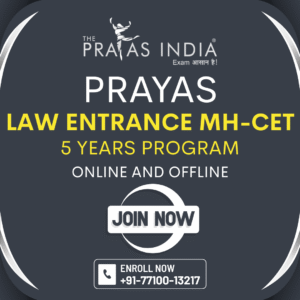What is CLAT Entrance Exam?
The Common Law Admission Test (CLAT) is a prestigious all-India entrance examination conducted for admissions to undergraduate (5-year integrated LLB) and postgraduate law programs offered by 22 National Law Universities (NLUs) across India. The 5-year program integrates a Bachelor of Arts (BA) with a Bachelor of Laws (LLB) degree and is designed for students who have completed their 10+2 education. The exam assesses candidates on their proficiency in Legal Aptitude, Logical & Analytical Reasoning, General Knowledge & Current Affairs, English language skills, and Quantitative Techniques.
Course Overview
The Prayas CLAT Entrance Exam Course offers a complete, well-structured preparation program to help aspirants confidently clear the challenging CLAT 5-year entrance exam. The course covers all major subjects in depth, focusing on enhancing conceptual clarity, problem-solving speed, and exam strategies. It prepares students thoroughly through expert coaching, regular mock tests, personalized doubt clearance, and current affairs updates, enabling them to gain admission into India’s top National Law Universities.
Key Features
- Comprehensive syllabus coverage of all CLAT 5-year exam subjects.
- Expert faculty guiding students with proven teaching techniques.
- Regular mock tests and practice exercises reflecting the latest exam trends.
- Strategic training for time management and question selection.
- Detailed session on current affairs and legal knowledge.
- Flexible online and offline learning modes with recorded lectures for revision.
- Dedicated doubt clearing and mentorship sessions.
- Post-exam counseling guidance for NLU admissions.
CLAT 5-Year Exam Pattern
| Section | Number of Questions | Marks |
|---|---|---|
| English Language | 28-32 | 28-32 |
| Current Affairs | 35-39 | 35-39 |
| Legal Reasoning | 35-39 | 35-39 |
| Logical Reasoning | 28-32 | 28-32 |
| Quantitative Techniques | 13-17 | 13-17 |
| Total | 150 | 150 |
Syllabus Highlights
- English Language: Vocabulary, grammar, reading comprehension, synonyms, antonyms, and analogies.
- Current Affairs: Important national and international events, general knowledge, history, geography, economics, politics, environment, and social issues.
- Legal Reasoning: Indian Constitution, IPC, contract law, tort law, legal principles, and application of legal reasoning.
- Logical Reasoning: Logical consistency, arguments, deductions, analogies, coding-decoding, and puzzles.
- Quantitative Techniques: Basic arithmetic, algebra, geometry, data interpretation, and problem-solving.
Admission Process
- Fill out the online application on the official CLAT website.
- Download the admit card when released.
- Appear for the computer-based test lasting 2 hours.
- View results and merit lists online.
- Participate in counseling to choose preferred NLUs and courses.
- Complete admission formalities at allotted institutes.
Top National Law Universities Through CLAT
- National Law School of India University, Bangalore
- NALSAR University of Law, Hyderabad
- National Law Institute University, Bhopal
- WB National University of Juridical Sciences, Kolkata
- National Law University, Jodhpur
- Various other prestigious NLUs across India
Prepare with Prayas CLAT Entrance Exam Course for expert-led, comprehensive coaching suitable for acing the CLAT exam and securing admission in India’s leading law schools.


